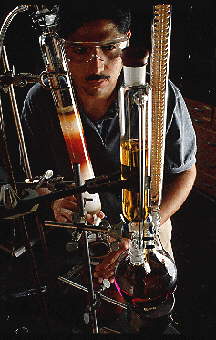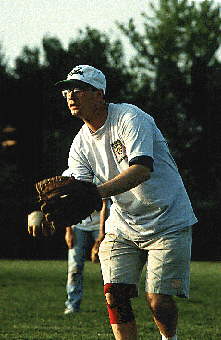UNIVERSITY OF DELAWARE
GRADUATE STUDIES IN CHEMISTRY AND BIOCHEMISTRY
The University of Delaware

- over 17,000 students
- over 100 undergraduate majors
- a graduate enrollment of about 2,500
- master's degrees in 80 fields and Ph.D. degrees in 40 disciplines
- founded in 1743 -- one of the oldest institutions of higher learning
in the USA
- Find out more about the university on the
University of Delaware homepage.
Visiting the University of Delaware
Delaware is a great place to live and learn
about any kind of chemistry. It is located in a major center of chemistry
and chemical research (both in the state and neighboring states) and has
more Ph. D.s per capita than any state in the country. We strongly encourage
prospective graduate students to visit us.
If you would like to visit, please contact Ms. Durkin by email, pmcmahon@udel.edu,
or telephone, 302 831 2462. Mention your area of interest and any faculty member
you are especially interested in talking to. Typically, potential students visit
campus for a day. They talk with faculty, tour the department and other university
facilities, and spend a significant amount of time with current graduate students
in the program at meals, etc. so that they get a broad view of our program.
Getting to Newark, Delaware, and the University is convenient from anywhere
in the northeast and from most of the rest of the world. Check out the
travel directions and maps for a guide that
directs you to our campus and the Department of Chemistry and Biochemistry.

The Department of Chemistry and Biochemistry
- a premier undergraduate and graduate program of the College of Arts
and Science
- occupies more than 200,000 square feet of teaching, office and research-laboratory
space located in

- H. Fletcher Brown Laboratory
- Quaesita Drake Hall
- the recently constructed Lammot du Pont Laboratory
- offers degree programs leading to
- Bachelor of Arts (with majors in Chemistry and Chemistry Education)
- Bachelor of Science (with majors in both Chemistry and Biochemistry)
- Master of Arts
- Master of Science
- Doctor of Philosophy.

Graduate Program
 The graduate
program in Chemistry and Biochemistry
The graduate
program in Chemistry and Biochemistry
- is one of the first two advanced-degree programs established at the
University of Delaware, awarding its first Ph.D.s in 1948
- has awarded more than 500 doctoral degrees and more than 300 master's
degrees
- has alumni who have achieved successful careers in industry, academia
and government laboratories
- has a faculty recognized locally, nationally and internationally
- had external grants of over 4 million dollars annually.
The moderate size of the graduate program provides
- excellent student-faculty interaction
- research opportunities comparable to
graduate programs of much larger size.
- participation in research across the traditional boundaries in the
chemical sciences
- frequent interaction with faculty in such other departments as chemical
engineering, physics, life sciences, and marine studies, particularly through
joint appointments.
- student participation in teaching and governance of the department
as representatives on departmental committees.

Graduate Degrees
Each graduate degree program has certain requirments, officially described
in the University of Delaware
Graduate Catalog and the Summary of Requirements
for Advanced Degrees in Chemistry and Biochemistry. The general features
are:
Master of Arts
- nonthesis degree
- 30 credit hours of coursework
- cumulative-examination requirement
- foreign-language requirement
|
Master of Science
- thesis-based degree
- 18 credits of coursework
- research requirement
|
Doctor of Philosophy
- specified coursework
- cumulative-examination requirement
- foreign-language requirement (in some subdisciplines)
- original research
- submission and oral defense of a dissertation on the research.
|
For further information, write
Graduate Program
Chemistry and Biochemistry
University of Delaware
Newark, Delaware 19716-2522
or request information electronically
|

Graduate Courses
The core of each student's program of development consists of course
work and independent research. Each area has specific course requirements.
However, certain general qualities of most students' programs include:
- Satisfaction of course requirements in two to four semesters.
- Availability of special-topics courses on the latest research in rapidly
developing research.
- Weekly seminar series in biochemistry, inorganic and organic chemistry,
and analytical and physical chemistry feature renowned academic, industrial
and government scientists.
- Monthly colloquia on topics of general interest to the entire chemistry
community.
In addition to the general course-based educational program, a wide variety
of other avenues for chemistry learning are available in Delaware. There are
specialized annual meetings on "Ion-Molecule Reactions" and "NMR
Spectroscopy" sponsored by the department, and the large numbers of chemical
companies in the area provide additional opportunities for further information
transfer at the University of Delaware.

Resources
The Department of Chemistry and Biochemistry has exceptional resources
for graduate research in chemistry and biochemistry.
A Wide Range of Research Instruments
- high resolution ultraviolet, visible, fluorescence, and atomic absorption
spectrometers
- picosecond laser spectrometers
- ultrafast FTIR spectrometers
- laser Raman spectrometer
- triple tandem mass spectrometer
- single-crystal X-ray diffractometers
|
- high-temperature flow calorimeters
- personal computers in virtually every laboratory
- university-wide computing capabilities with a cluster of Sun computers
- CaCheTM Molecular Modeling system
- A cluster of Silicon Graphics workstations
(details)
|
- peptide sequencers
- peptide and DNA synthesizers
- amino acid analyzers
- preparative and analytical ultracentrifuges
- circular dichroism spectrometers
|
Three major analytical facilities support research and teaching in the
Department:
- The Blue Hen NMR Complex
- Seven liquid- and solid-state NMR and ESR spectrometers routinely used
by graduate students in research
- Full-time Ph.D. NMR spectroscopist
- Mass Spectrometry
Laboratory
- Standard electron-ionization (EI) mass spectrometry
- Fast-atom bombardment (FAB) mass spectrometry
- Chemical ionization (CI) mass spectrometry
- Electrospray mass spectrometry
- GCMS
- Full-time Ph.D. mass spectrometrist
- X-ray laboratory
- Two modern diffractometers that provide state-of-the-art crystal structure
analysis
An Outstanding Staff
- glassblower
- four machinists
- three electronics technicians
- an electronics design engineer
- support for laboratory preparation
Extensive Library Resources
- The Chemistry Library, located in Brown Laboratory, contains an extensive
collection of reference works and monographs, and carries subscriptions
to over 200 journals.
- Hugh M. Morris Library, a two-minute
walk from the department, contains more than 2 million volumes
- Library catalogs are conveniently available on line from locations
within the department
- Bibliographic databases, including those of the American Chemical Society,
available on line.

Activities
While our focus is on science, fun is also a part of graduate-student
life at Delaware.
- Interactions among students are strongly encouraged, whether in work
or outside the lab.
- Students lunch together on the steps of Brown Lab or
- Participate in team sports such as volleyball or softball
- The University's location offers
- University-sponsored activities on campus
- cultural and sports events in nearby Philadelphia or Baltimore
- access to New York City and Washington by short train rides
- a lazy day at the beach in southern Delaware.

Housing
Apartments, shared houses and other arrangements can often be made through
the University.
The department also informally assists students to find comfortable,
affordable housing, either separately or as groups. Please ask for further
information when applying.
Financial Assistance
- Students typically are supported as teaching or research assistants,
and a stipend is provided.
- Tuition is waived for students under contract.
- Teaching assistants are an integral part of the teaching program of
the department, and their interaction with undergraduate students provides
resources in chemistry that add depth to the educational experience. Teaching
assistants spend eight or nine hours per week supervising undergraduate
laboratories and a comparable amount of time in preparation, office hours,
and grading.
- Research assistants are paid from faculty research grants.
- University and departmental fellowships are awarded to exceptional
students.
- Graduate students in good standing in the Ph.D. program are provided
calendar-year support for five years from the time of entry in the graduate
program.
- Students may be eligible for federally guaranteed loans.
New-Student Orientation
New graduate students have a great deal to do to get adjusted to the
demands of work in a graduate program. A week before classes start, they
- attend University and departmental orientation programs
- get academic advisement
- gain information and training for their roles as teaching assistants
- meet their new colleagues.

After Graduate School
Almost all graduates find positions in industry, in government laboratories
or in academic posts. Initial contacts between students and potential employers
often occur due to contacts between faculty and industry, government and
academic institutions. The best indicators of the opportunities afforded
by an advanced degree in chemistry and biochemistry from the University
of Delaware are the over 500 successful graduates of our program such as:
John Allison, Ph.D. 1978
Professor, Michigan State University |
Stephen Butter, Ph.D. 1965
Program Manager, U.S. Department of Energy |
| Isaac Sanchez, Ph.D. 1969, Matthew Van Winkel Regents Professor
of Chemical Engineering at the University of Texas, Austin . Elected to
the National Academy of Engineering. |
|
John Evans, Ph.D. 1977
Professor, University of Minnesota |
Walter J. Freeman, Ph.D. 1972
Vice-President, Hercules, Inc. |
Ned Heindel, Ph.D. 1963
Professor, Lehigh University |
Anthony Kossiakoff, Ph.D. 1972
Director of Research, Genentech |
Joachim Liehr, Ph.D. 1969
Professor of Pharmacology, University of Texas |
Wolfgang Muehlbauer, Ph.D. 1990
Vice-President, DMG Dental-Material Gesellschaft |
John Michnowicz, Ph.D. 1972
Manager, Scientific Instruments Division, Hewlett-Packard |
Jane Margaret O'Brien, Ph.D. 1981
President, Hollins College |
JoAnne V. Smith, Ph.D. 1977
Director of Analytical Services, PPG Industries |
Gene Wilds, Ph.D. 1974
Manager, Corporate Center for Analytical Science
E. I. du Pont de Nemours & Co., Inc. |
The advanced degree in chemistry and biochemistry from the University
of Delaware thus takes the graduate to many different careers, of which
these are only a sampling. Ask any of our 500+ graduates, and you will
learn the possibilities that graduate education in chemistry and biochemistry
at the University of Delaware can bring.
Getting in Touch
To find out more about the graduate program in chemistry and biochemistry
at the University of Delaware, to request application information, to arrange
a visit to the department, or just to talk about
the possibilities, you can
- Call Ms. Jen Durkin, the department staff assistant, at (302) 831-2462
between 8 a.m. and 4:30 p.m. (U.S. eastern time) weekdays, or fax at (302)
831-6335
- Contact Ms. Durkin by electronic mail at: pmcmahon@udel.edu
- Write to:
Graduate Admissions:
Department of Chemistry and Biochemistry
University of Delaware
Newark, DE 19716-2522

Copyright, 1996, the University of Delaware.
Latest revision:
July 14, 2003


 The graduate
program in Chemistry and Biochemistry
The graduate
program in Chemistry and Biochemistry